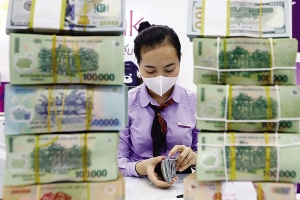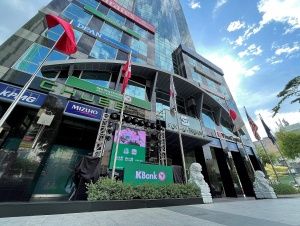Stronger risk management imperative
Nguyen Quoc Hung, vice president and secretary-general of the Vietnam Banking Association, stressed the paramount importance of risk management in the banking sector to mitigate latent risks at last week’s ASEAN banking seminar.
 |
| Stronger risk management imperative, illustration photo/ Source: freepik.com |
“Recent crises, including the collapse of Silicon Valley Bank and Signature in the United States, significant interest rate reductions by Chinese banks due to bad real estate debts, and the shutting down of prominent global investment bank Credit Suisse, have shed light on the weaknesses in banking risk management. This underscores an urgent need to establish and operate more effective risk management systems, including in Vietnam,” Hung said.
In addition, Vietnam’s banks are confronting traditional risks and those stemming from digital transformation, such as cyberattacks, system freezes, and personal data breaches, which could have severe implications for a bank’s financial standing and reputation.
“To cope with new banking operational challenges, local banks have constructed plans on digital transformation risks. Many banks have progressively adopted the international Basel III standards, established a three-tier defence line, and implemented International Financial Reporting Standards to enhance transparency,” Hung added.
According to a 2023 study by Oliver Wyman Risk Management Association, aside from recessionary concerns, the most frequently cited chief risk officer priorities over the next 12 months are all related to non-financial risk, including consumer compliance, cyber risk, fraud and financial crime, and operational resilience.
Each of these has different drivers for appearing in their top five risk priorities. For instance, consumer compliance concerns stem in part from high-profile consumer financial protection bureau enforcement actions and pressure on banks to eliminate unfair practices. Cyber risk, which was also overwhelmingly cited as a top risk facing the bank (80 per cent), has been exacerbated by recent geopolitical events. Concerns around fraud and financial crime tend to increase in a worsening economic environment.
“In particular, nearly 90 per cent of respondents view climate risk as either an emerging risk or a more mature risk that is material, with larger banks more likely to view climate as a risk that has ‘emerged’, rather than one that is still emerging,” the report noted.
Notwithstanding, regulatory bodies have been perceived as somewhat sluggish in addressing these burgeoning risks. They tend to require banks to frame their own risk management blueprints long before providing comprehensive regulatory guidelines.
Supporting this, Carey Hsu, head of Risk Management at Oliver Wyman in the US, cited examples at the event.
“The forest fires in Indonesia resulted in an economic loss of $5.2 billion, while floods in Malaysia led to economic damage and asset depreciation worth $1.4 billion.”
Singapore has further set a precedent in Southeast Asia, committing to phase out petrol-powered vehicles. With a proposed ban on the sale of internal combustion engine vehicles post-2030, the nation saw sales of electric vehicles surge to 8.4 per cent of total car sales in the first half of 2022, a doubling from the previous year’s figure.
Vietnam, on the other hand, is grappling with the potential early closure of its coal-fired power plants with 28GW capacity before 2040, leading to significant compensation for existing stakeholders and investors.
Tom Garside, head of Risk Management at Oliver Wyman in Singapore, highlighted that as global temperatures rise, nations like Vietnam could experience harsher weather events, escalated sea levels, and altered rainfall patterns. Such environmental changes could pose tangible financial risks to bank customers’ assets, eventually materialising as credit and market risks for local banks.
“Policy measures by governments to counteract climate change will inevitably reshape the economies of several sectors, such as palm oil and coal. These alterations will pose revenue and profitability challenges for bank customers, subsequently translating to credit and market risks,” Garside said.
“Increased scrutiny from the global customer and investor community will place ever greater responsibilities on banks to act righteously. Consequently, significant sectoral shifts among clients will alter revenue sources for banks, introducing strategic risks,” he added.
ASEAN Banking Association secretary-general Paul Gwee emphasised that, while Vietnam faces hurdles in its global integration, addressing both the country’s internal and external economic challenges is paramount.
“Banks must diligently assess the risks posed by climate change on their lending portfolios. Neglecting these concerns could escalate into substantial financial and reputational setbacks,” Gwee said. “Banks must proactively anticipate potential challenges, ensuring rapid crisis management, effective recovery from downturns, and efforts to diminish the overarching impacts of risks on the broader financial ecosystem.”
 | Banking sector focuses on credit institution restructuring associated with bad debt settlement The banking sector should take more drastic measures to restructure credit institutions in association with the settlement of bad debts to contribute to curbing inflation and stabilising macro-economic factors, according to insiders. |
 | Vietnam's banking sector faces uphill battle in 2023: FiinGroup Vietnam's banking sector is grappling with stagnant credit growth, rising non-performing loan (NPL) ratios, and the need for sustainable credit activities amidst the economic challenges in 2023. |
 | Asset quality crucial to banking sector Tran Thi Khanh Hien, head of Research at MB Securities, delves into the factors impacting bank performances this year. |
 | KBank explores potential M&A deal in Vietnam's banking sector Kasikornbank (KBank), a commercial bank from Thailand, is in talks to acquire Home Credit Vietnam, according to two sources. |
What the stars mean:
★ Poor ★ ★ Promising ★★★ Good ★★★★ Very good ★★★★★ Exceptional
Related Contents
Latest News
More News
- Cashless payments hit 28 times GDP in 2025 (February 04, 2026 | 18:09)
- SSIAM and DBJ launch Japan Vietnam Capital Fund (February 04, 2026 | 15:57)
- Banks target stronger profits, credit growth in 2026 (February 04, 2026 | 15:43)
- Vietnam on path to investment-grade rating (February 03, 2026 | 13:07)
- Consumer finance sector posts sharp profit growth (February 03, 2026 | 13:05)
- Insurance market building the next chapter of protection (February 02, 2026 | 11:16)
- NAB Innovation Centre underscores Vietnam’s appeal for tech investment (January 30, 2026 | 11:16)
- Vietnam strengthens public debt management with World Bank and IMF (January 30, 2026 | 11:00)
- Corporate bond market poised for stronger growth cycle (January 28, 2026 | 17:13)
- Vietnam's IPO market on recovery trajectory (January 28, 2026 | 17:04)

 Tag:
Tag:




















 Mobile Version
Mobile Version